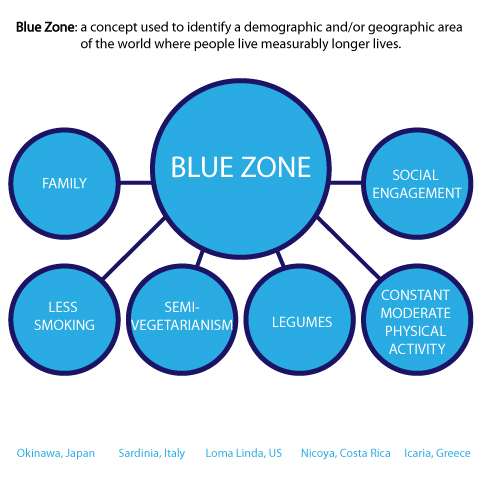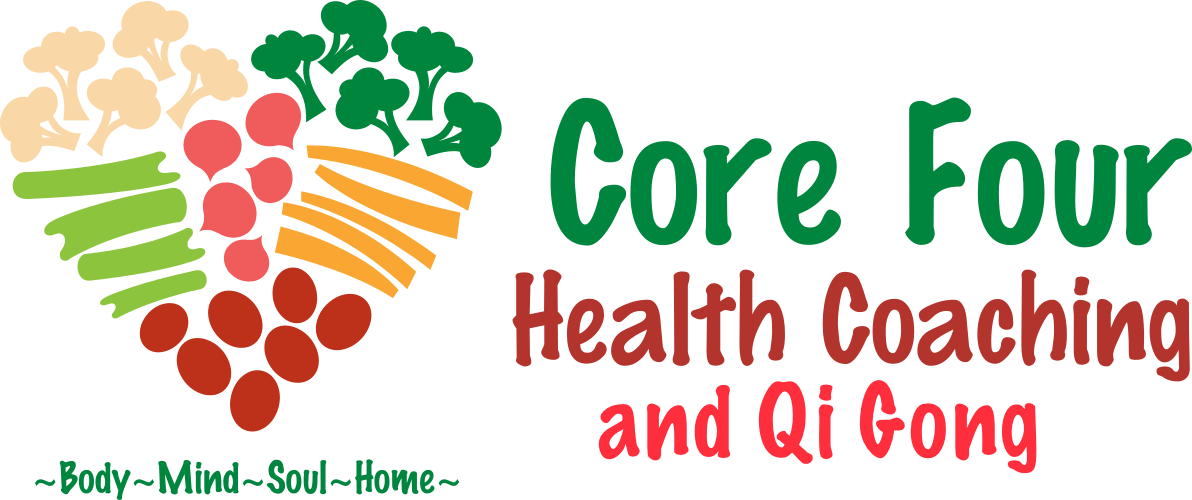
You have heard the slogan for years: "Walt Disney World - The Happiest Place on Earth." It's a great tagline. It ranks right up there with some of the best taglines of all time - NIKE-Just Do It, Kentucky Fried Chicken-Finger Lickin' Good, Wendy's-Where's The Beef?, and Bounty-The Quicker Picker Upper.
I am here to tell you that Disney World is actually NOT the happiest place on Earth. I have been researching this for several months now. It is something that really fascinates me. Where in the world do the happiest people live? The locations filled with the happiest people are now being referred to as the "Blue Zones." This is not a political statement. It has nothing to do with red states and blue states.
The "Blue Zones" are what National Geographic dubbed the five geographic areas where people statistically live the longest: Okinawa (Japan); Sardinia (Italy);
Nicoya (Costa Rica); Icaria (Greece) and Loma Linda, California (home of the Seventh Day Adventists). This anthropological study, first sponsored by the magazine over 10 years ago, is based on empirical data and first hand observations, as to why the populations in these locations are living healthier and longer lives. Dan Buettner wrote the National Geographic cover article "Secrets of Long Life" back in 2005 (which is one of their top 3 highest selling issues ever) and has authored several best-selling books on the subject since then. The most recent ones are The Blue Zones Solution: Eating and Living Like the World's Happiest People and The Blue Zones of Happiness: Lessons From the World's Happiest People. Dan's research took him around the world again, this time in search of the geographic locations where the happiest people live. After extensive analysis, he found out that the happiest people in the world live in Singapore, Costa Rica and Denmark.
Dan found the happiest people in the United States also!
The Top 5 Happiest Cities in America are:
#1 - Boulder, Colorado
#2 - Santa Cruz-Watsonville, California
# 3 - Charlottesville, Virginia
#4 - Fort Collins, Colorado and
# 5 - San Luis Obispo, California
I know what you are thinking right now. So we have to move to another part of the world in order to maximize our happiness and lead a longer and healthier life? The great news is "NO" - there are no moving vans required in order to get happier. Dan Buettner says that only 15% of our happiness is determined by our environment and only 40% is pre-determined by genetics. The remaining 45% is up to us! There are important life lessons that we can learn from how the happiest people are living. Dan found the common denominators of the happiest places. In the happiest places, residents have a high level of trust in their police, neighbors, and local government; they have sidewalks and safe streets that are very people-friendly and allow them to take walks; they are actively involved in their local communities; their environment is extremely clean; they are surrounded by people with healthy behaviors (eg, non-smokers); and they have access to affordable health care and healthy food.
I wonder if the rate of people choosing to retire to Colorado or California has gone up since the results of this study were published. My own family wants to relocate to South Bend, Indiana. This has nothing to do with whether or not the residents are happy. It has everything to do with it being the home of the University of Notre Dame, which is my husband's alma mater and his happy place.
Short of picking up roots and moving to a happier location, what can we do to create our very own Blue Zones? These are the things that Dan Buettner says we can do now and the changes we can make today to live our happiest lives:
1) SOCIAL INTERACTIONS- The happiest people on Earth interact with others at least 6-7 hours per day. They spend time speaking with one another face-to-face having meaningful conversations. I am fairly certain this means real conversations, not FaceBook ones.
2) LIVE WITH PASSION and PURPOSE - The happiest people on Earth wake up each day with purpose, pleasure and pride. It's all in their attitude. As I tell my sons, you can choose to wake up and say "Good God, it's morning" (said in the tone of a sleep-deprived, grumbling teenager) or when the morning alarm clock goes off you can greet the day with an enthusiastic "It's a Good Morning, God!" The same few words take on an entirely different meaning depending upon the attitude of the person saying them.
3) IT TAKES A VILLAGE - The happiest people on Earth live in a co-housing community where they cook and eat meals together. It means they only have to cook one night a month, but it's for 100 people! I have heard of small groups of friends doing this with each other. They organize a rotational schedule where they each take turns cooking for the group, thus reducing their nightly meal prep to once every several days instead of every night.
4) SUPPORT NETWORK - The happiest people on Earth support each other with every aspect of each other's lives which the studies have shown has significantly lowered their stress levels. Buetter recommends forming a "moai", a term that residents of Okinawa, Japan, use to describe small groups of about five friends who commit to supporting each other for the long-term.What can we do to make this happen in our own lives? Offer to run errands for each other? Pick up an extra loaf of bread or gallon of milk for a neighbor? (I am blessed to have a next-door neighbor Michele who does this!!) Or offer to trade babysitting duties so everyone gets a date night? These are all great ideas. I am sure you can come up with your own that are even better.
5) STOP BUYING THINGS - In Boulder, Colorado, one of the happiest cities in the US, there are severe limits on advertising. Boulder has absolutely no billboards. Dan Buettner says that "the extent to which we spend money is very much a product of our environment. If you’re constantly prompted to buy stuff, if constant marketing messages are rinsing over your psyche, you’re more likely to buy things than to spend that money more wisely on experiences or financial security. So that’s yet another way we can think about our environment shaping our happiness."
6) HAVE A FRONT PORCH (and sit on it regularly) AND A ROOM WITH A VIEW - In Boulder, the buildings in downtown are built in a way that preserves the beautiful view of the Rocky Mountains. While we all cannot have that kind of view, we can make sure we get our daily exposure to and view of nature's beauty.
7) BE GENEROUS and VOLUNTEER YOUR TIME - According to studies, you are two times more likely to be happy if you are helping others. Find opportunities to volunteer that allow you to engage with others and to use your skills and strengths.
8) LOVE WHAT YOU DO - Remember the lyrics to the Crosby, Stills & Nash song "Love the One You're With?" It goes..."....if You can't be with the one you love, love the one you're with"....well that is the same approach we should take with our work. The happiest people on Earth are very passionate about the work they do. It brings them a sense of pride and much joy. Sure, you need a paycheck, but Dan says that "if you earn enough to feed your family, cover your mortgage and pay for your children's dental work, earning more isn't likely to make you much happier. Once you have the basics accounted for, you should stop sacrificing to make more money and shift your efforts to other things."
The ideal job would be one that allows you to learn something new and interesting every day, where you are inspired daily and encouraged to be inspiring. You would have a very short commute, be highly compensated and the work you do would be closely aligned with your personal ethics. If your current job falls short of meeting everything on your "must have" list for happiness, there are things you can do to "love the one you're with." Buettner says that even just having a best friend at work can do wonders for your happiness. He says "that's the biggest determinant of whether you like your job." He also suggests that using up your vacation time in short periods of time-off throughout the year will likely make you happier than taking one long vacation. That's because much of the pleasure people get from vacations comes from planning and remembering them. So the more vacations you take, the more you'll have to plan and remember. At the end of every one of our family vacations, my husband asks for a photo of our favorite spot or sunset or memory to take with him when he returns to work. It's his way of making sure the "vacation glow" lasts longer and helps to keep him motivated at work until the next vacation.
These are just several of Dan Buettner's suggestions for how to increase our happiness which will lead to living a healthier and longer life.
Are there any of these ideas that you may adapt today? Do you have a few of your own ideas?
Share them with me and together let's turn our worlds a lovely shade of BLUE.

